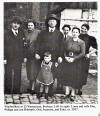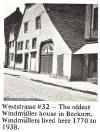The
Escape of the Philipp Windmüller
Family
This report is based on information received from Philipp’s granddaughter Amy Windmueller-Markon of Minnesota, USA. My thanks go to her, for her permission to include this summary.
Also included are some
data and photos from the Windmueller
Family Chronicle (page 183)
 In June 1939
the Philipp
Windmüller family left Beckum for
Dortmund. The story of their departure from Germany was unusual. Harry Truman, then a senator from Missouri,
intervened at one stage, and wrote a letter to the US Consul-General in
Stuttgart, requesting visas for the Windmüller
family. Earlier, they had
been denied such a visa, because their young son Helmut had a cold. The
ruling was, that if anyone in the traveling party was
sick, the visas were denied.
Subsequently the visas were approved - but only for the immediate
family. Philipp's sister Jeannette (b.
1884, d. Holocaust) affectionately called
Nettchen), who lived with Philipp
and Erna in their house in Beckum on Weststrasse
32,
was not considered an immediate family member and thus was not included in the permit. Philipp insisted on
staying with Jeanette - and besides, he considered himself a good German
In June 1939
the Philipp
Windmüller family left Beckum for
Dortmund. The story of their departure from Germany was unusual. Harry Truman, then a senator from Missouri,
intervened at one stage, and wrote a letter to the US Consul-General in
Stuttgart, requesting visas for the Windmüller
family. Earlier, they had
been denied such a visa, because their young son Helmut had a cold. The
ruling was, that if anyone in the traveling party was
sick, the visas were denied.
Subsequently the visas were approved - but only for the immediate
family. Philipp's sister Jeannette (b.
1884, d. Holocaust) affectionately called
Nettchen), who lived with Philipp
and Erna in their house in Beckum on Weststrasse
32,
was not considered an immediate family member and thus was not included in the permit. Philipp insisted on
staying with Jeanette - and besides, he considered himself a good German
 who
had fought in WWI. But
Erna refused to stay any longer, and endanger the boys. In the end, Philipp was persuaded to leave together with his family.
who
had fought in WWI. But
Erna refused to stay any longer, and endanger the boys. In the end, Philipp was persuaded to leave together with his family.
Philipp (1888 - 1956) and
Erna (BAER, 1904 - 1965), together with their children Fritz (Fred, 1933 - 2005) and Helmut (Henry,
1935 - ), thus left Germany
on 20 August 1940. They traveled through
Russia and Japan, and stayed in Singapore for a while before boarding a ship to
cross the Pacific. On 23 September 1940 they arrived in Seattle WA and traveled to Kansas City
for a family visit, before settling in Richmond VA. For some years, they lived on a farm in Dutton VA, in one of the sharecroppers' houses.
In 1946 the family learned that Jeanette had died in one of the camps. Philipp had a mental breakdown upon learning this news and was overcome with guilt at having left Jeanette behind. He continued to work in his modest grocery store with Erna, but became a broken man. He died in 1956 in Richmond. Erna lived in Richmond until her death in 1965.
